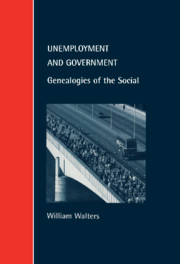Book contents
- Frontmatter
- Contents
- Acknowledgements
- Introduction
- 1 The Discovery of Unemployment
- 2 Inventing Unemployment: The Birth of the Labour Exchange
- 3 Governing Unemployment as a ‘Risk’
- 4 Governing Through the Long-Term Unemployed: Unemployment Between the Wars
- 5 Unemployment and its Spaces
- 6 Governing Divided Societies: The New Deal
- Conclusion
- Notes
- Index
1 - The Discovery of Unemployment
Published online by Cambridge University Press: 07 September 2010
- Frontmatter
- Contents
- Acknowledgements
- Introduction
- 1 The Discovery of Unemployment
- 2 Inventing Unemployment: The Birth of the Labour Exchange
- 3 Governing Unemployment as a ‘Risk’
- 4 Governing Through the Long-Term Unemployed: Unemployment Between the Wars
- 5 Unemployment and its Spaces
- 6 Governing Divided Societies: The New Deal
- Conclusion
- Notes
- Index
Summary
Society is built up on labour; it lays upon its members responsibilities which in the vast majority of cases can be met only from the reward of labour … its ideal unit is the household of man, wife and children maintained by the earnings of the first alone. The household should have at all times sufficient room and air according to its size – but how, if the income is too irregular always to pay the rent? The children, till they themselves can work, should be supported by the parents – but how unless the father has employment? The wife, so long at least as she is bearing and bringing up children, should have no other task – but how if the husband's earnings fail and she has to go out to work? Everywhere the same difficulty occurs. Reasonable security of employment for the breadwinner is the basis of all private duties and all sound action.
Historians are in general agreement that the term ‘unemployment’ only entered into official and popular usage in the last decade or so of the nineteenth century. Yet the social and political question of worklessness, and of destitution connected with want of employment, is obviously much older. Almost three centuries ago, Daniel Defoe, in a statement which still resonates today, expressed a condemnatory view of those who attributed their misfortune to an inability to find employment: ‘The reason why so many pretend to want work is that they can live so well with the pretense … [that] they would be mad to leave it and work in earnest.’
- Type
- Chapter
- Information
- Unemployment and GovernmentGenealogies of the Social, pp. 12 - 35Publisher: Cambridge University PressPrint publication year: 2000



